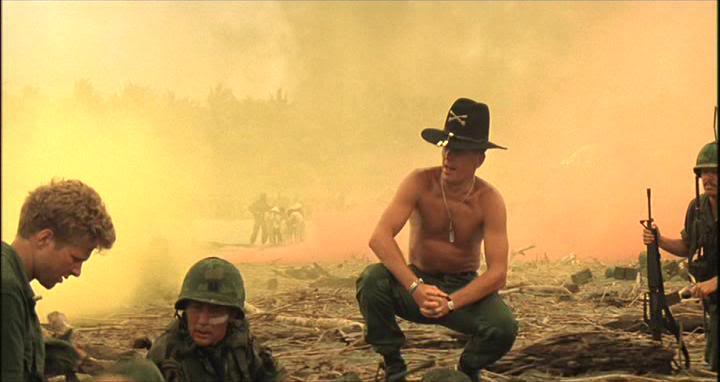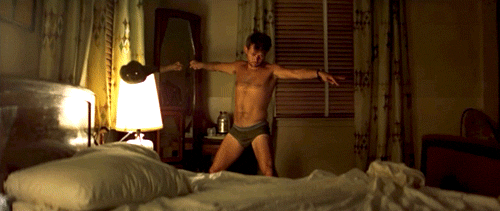Apocalypse Now was 17th on my list, although once again it probably could have been higher. It used to be one of my very favourite films, but I haven't seen it in a while.
Here's what I wrote when I first saw it, it's not greatly written (there's bits I look at and think: I wrote that? I was still quite a film n00b then) but it's interesting to see how much I genuinely liked it when I first saw it. I used to rate films too highly back then and I hadn't watched many great films, but I have seen it a few times now and it's definitely still great.
I also own
Hearts of Darkness on Blu-ray (as part of the
Apocalypse Now set) but haven't got round to it yet, I will try to correct that soon.

After I had watched
Psycho I decided to watch
Apocalypse Now for similar reasons. Both were two of the highest films on my watch list and recent posts by a member on here persuaded me not to delay my viewings and finally watch them. The work of Hitchcock made me want to see Psycho after immediately falling in love with some of his films, the same can be said of Coppola although I had only seen "The Godfather" it was a film that afterwards I knew I had just watched a masterpiece.
Apocalypse Now is a film of three thirds (I decided to watch the Redux version, perhaps two halves is more applicable to the original) and it's no surprise that Quentin Tarantino rates this film as one of his favourites of all time with the first third something you'd expect to see from the director himself.
In the first third, Coppola manages to create one of (if not) the greatest battle scenes in film history. We see the Americans lead by Capt. Kilgore destroy an entire Vietnamese village. Although some may see this seen as maleficent and uneasy due to the sheer amount of bloodshed, the superb performance of Kilgore turns it in to an extremely enjoyable, bizarre and fun scene. We see him turn on music and joking around before killing hundreds of people, then once the men land on ground we see him getting ready to search the waves amidst all the chaos as he produces one of the film's most memorable lines, "I love the spell of napalm in the morning". Robert Duvall creates one of the most memorable and fun characters in film history, someone who flourishes in the setting of war and someone whose insane behaviour will stay in our minds long after viewing.
In the middle the film tends to drag more than the other thirds, some of the scenes are justified as we learn more about Captain Kurtz, an ex soldier who has gone insane and set himself up as a God among the local people. At first it seems that we can attempt to justify some of Kurtz actions and can understand why he may have gone crazy, it is not until the finally scenes that the full extent of his command is revealed.
Martin Sheen portrays the film’s main character, Captain Willard, the narrator of the story and the man sent on the mission to assassinate Kurtz. His morals and attitude towards the various situations are important to the film, at first he feels reluctant to murder a US soldier, where as in the final scenes we see a much more different side to his character upon finally meeting Kurtz. At first we begin to understand why the war would turn someone crazy, after all surely Kilgore himself could be classified as such?
Watching the Redux version I can certainly understand the criticisms that people have for the film with two scenes, the second meeting with the playmates and the dinner conversation with the French family seeming odd and out of place as well as lengthening the film without little contribution however it certainly does not make the film worse in anyway and allows use to have a perhaps much needed retrieve from the action filled scenes that come both before and after it.
Slight Spoilers in paragraph - I won’t say much about the final third in case you have not seen the film (despite the spoiler warning), but once we finally get to the Kurtz compound the scenes that follow are brilliant and horrifying at the same time. Dead bodies dangling around everywhere and decapitated heads provide us with a horrifying setting and the scale of the size, the amount of men under Kurtz command is horrifying in itself. The final scene that involves the sacrifice of a buffalo (which was very much real, adding a shocking and brutal feel to amplify an already dark scene), the final scene in which we see Willard stand facing the entire tribe is brilliant and his pause for a split second is brilliantly captured as he reacts to the perhaps unexpected and once again sees the extent of command Kurtz has setup.
The film's use of sound and music is also like no other for which it deservedly won an Oscar for, going back to the battle scene the music played helps great a grand joyous feel to the whole situation despite hundreds of deaths, the sound throughout is superb, from the opening sequences to the final scene. Marlon Brando, the film’s main star has little time on screen and when he does we barely get to see his face, a deliberate and brave decision that helps build up the mystery and scary character that he is.



